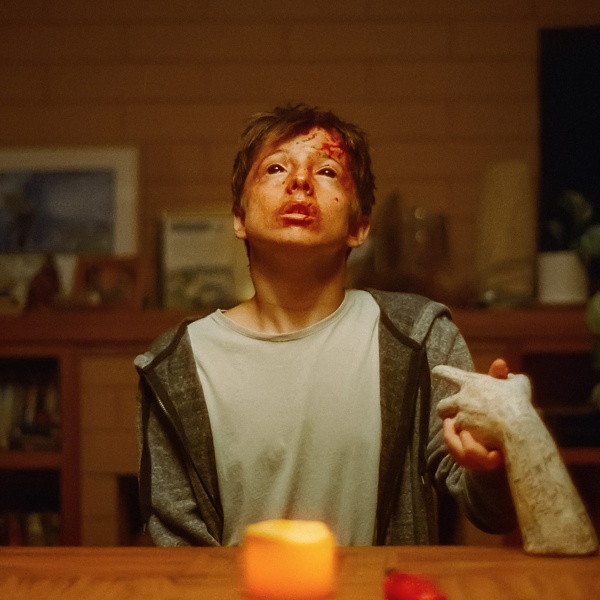Christine Vachon doesn’t mess around. She is a film professor, best-selling film book author, wife, mother of a film marketing professional, and most of all, producer of independent films. They’re often directed by her close friend and fellow Brown alumnus Todd Haynes. She launched her career at Sundance 1991 with her first feature film, Haynes’ “Poison,” which won the Grand Jury Prize.
Since 1995, she and her producing partner Pam Koffler’s company Killer Films has steadily produced hundreds of movies and television series. Many have won prizes and nominations over the years for the likes of Hilary Swank (“Boys Don’t Cry”), Julianne Moore (“Still Alice”) and Cate Blanchett and Rooney Mara (“Carol”), but this year’s Best Picture Oscar nomination for Celine Song’s “Past Lives” is Killer’s first.
New York-based Vachon was packing her bags for the Berlin International Film Festival when we spoke on Zoom, a week after Song won the DGA for Best First Time Director, and before Vachon and her team celebrated the “Past Lives” Spirit wins for Best Feature and Director and Samy Burch and Alex Mechanik’s Best First Screenplay win for “May December.”
Here’s what it takes to be the consummate indie producer.
Travel to film festivals
She shepherded A24’s Sundance hit “A Different Man,” starring Sebastian Stan, Renate Reinsve, and Adam Pearson, for its international premiere in Competition at Berlin, mirroring last year’s Sundance/Berlin double-header, “Past Lives.” Vachon travels so much that she’s been sharing on social media for years her reviews of the VIP lounges at various airports. (Like most discerning travelers, she prefers Delta.)

Promote Oscar contenders
This year she has two, “Past Lives,” which is nominated for Best Picture and Best Original Screenplay, along with “May December.” “I’m doing a lot of the Academy stuff, why not?” said Vachon, who participated in the Producers Panels at the Santa Barbara International Film Festival and the Producers Guild of America, the AFI Film Awards and Oscar Nominees Luncheon, along with countless Q&As. “We’re going back and forth for that.”
Vachon has been to the Oscars a few times, for “Carol” and “Far from Heaven,” among others. Her first go-round was Haynes’ “Velvet Goldmine,” which landed a Best Costume design nomination for Sandy Powell, her first. “We went into the bar at the Oscars,” she said, “and I used my AT&T card in the phone booth so that she could call her mother and tell her. Those are the old times.”
Stretch a budget when you have a tight shooting schedule
Vachon doesn’t have the luxury of time afforded big-budget studio movies like “Barbie” and “Oppenheimer.” “‘Killers of the Flower Moon’ spent a million and a half dollars on gasoline,” she said. “May December” shot in 23 days. “Past Lives,” 25. “They’re both modest, modest budgets, really hard to pull out. You don’t have any wiggle room, you don’t throw money at problems, you have to come up with creative solutions.”

Ride the waves of a vacillating and constricting film industry
Greenlights are still slowed down post-strikes, although Killer Films sped up production during the pandemic. “We were prolific in the pandemic,” she said. “Now there’s a bit of paralysis of what’s next? The strikes are behind us. How is the business changed? People can say for certain that there’s a general shrinking or tightening. And so many of the actors that helped fuel the financing for our projects, they had to postpone a lot of their production. So a lot of things are just still waiting to land. Like, A-list actor attached to indie project, who didn’t do their Marvel movie, who didn’t do their other indie movie. So they’re trying to juggle all of that, and we’re trying to see where we fit in, slowly unsticking. I feel pretty confident about at least three of the films that we have going forward. But it’s definitely taking a little longer than we all thought.”
Juggle multiple projects
Nonetheless Killer Films is pushing forward on several fronts, including a new Burch script that is being set up. Sometimes they function as executive producers on films like their “Halston” director Dan Minahan’s “On Swift Horses,” Brady Corbet’s “The Brutalist” (Focus), and “Omni Loop,” which has SXSW stamped all over it. “We weighed in on casting and post-production and we didn’t get our hands dirty,” she said.
Embrace the foreign sales financing model
A24 also brought to the European Film market (EFM) in Berlin Celine Song’s completed script “The Materialists,” which reunites the “Past Lives” producing team, including David Hinojosa’s 2AM. It’s another triangle with a woman interested in one man but still enmeshed with an earlier love. A-list casting possibilities include Pedro Pascal, Dakota Johnson, and Chris Evans.
Todd Solondz’s “Love Child,” a marital thriller and Hollywood movie homage starring “May December” discovery Charles Melton and Marvel star Elizabeth Olsen, was also selling at the EFM. Killer produced Solondz’s “Happiness” and “Wiener Dog.”
Killer is also bringing to Berlin Haynes’ untitled Joaquin Phoenix project, which Vachon expects to shoot this summer. “The sales have been healthy so far,” she said, as international distributors offer pre-sale guarantees on movies still to be made. The banks advance cash to make the film based on those guarantees, and the territories get to finally distribute the finished films. The downside of this system is it is based on each country placing value on the elements of a movie, especially the stars. The foreign distributors are often woefully out of date, using old numbers and comps.

“One of the things that’s difficult about putting together a movie,” said Vachon, “is how do you assign value to a project? You have to take all the various elements, the director, the script, and the attachments, and the only real thing that you can assign value to is a director with a track record. Right? But if they choose to do something artful or that’s deemed uncommercial then all you have are the actors. And getting those lists that we all get, and that we keep quiet, that one’s worth X in Taiwan. It’s bananas. You toss around these names like they are items of clothing. That’s A list. That’s a B. That’s C, that’s not even worth it. But it’s a way to get a movie made and still maintain a modicum of true independence over the material.”

Recognize the value of a great script
“Past Lives” had no marketable elements. But Song wrote a script the town was buzzing about. “Sometimes the marketability is just a brilliant script,” said Vachon. During the pandemic, Koffler made some calls asking agents to send over their best scripts. CAA sent Song’s script.
“Pam read it. And she said to me at the time, ‘It’s not available, but I just read this extraordinary script, and you should read it,’” she said. “And she knows how much I don’t like to read scripts. So many are terrible. They don’t have that thing that transports you, that essentially makes you forget you’re reading a script. You just want to see what happens, and it’s not announcing itself to you on every page. So when she tells me to read something, I do. ‘Past Lives’ had a cohesive voice within the first page. You were hooked. And off you went and you trusted her voice, you trusted her vision. I felt like I was in the hands of a master storyteller.”
Support rookie directors
Luckily, A24 reached out to Killer offering a meeting with Song, who was looking for a producer. “We sat down with her,” said Vachon. “That meeting was about: ‘Does she understand the story she’s going to tell?’ Because we knew she was a first-timer. And that doesn’t scare us. It’s easy to teach somebody what a grip stand is, how to read a call sheet, all of those things. You can’t teach someone how to tell a story, I don’t think.”
The other crucial thing was to work with a new director who wants to learn. “Celine knew what she didn’t know,” said Vachon. “So there wasn’t any bluster, or, ‘Let me just kind of fake my way through this.’ She was honest: ‘Can you explain this to me?’ As a director, she had command of her set, but not in a dictatorial way. But in a way of true mutual respect.”
Pay attention to what’s going on around you
Vachon never sits back complacently. She stays aware. “So much of it is knowing how to listen to the market,” she said. “And not sit there and wait for the market to change its mind because it’s not going to. And we’ve had plenty of directors, or inexperienced producers say to us, ‘But I don’t understand if we have so and so attached, how come we’re not getting more? I don’t get it.’ That’s just the way it is, because the market speaks clearly. And it tells you, ‘This is what you’re going to get.’ You can either move on and decide that you can’t make it for that amount of money, or you figure out how to do it.”
Stay strong and nimble
While Vachon loves producing movies, production shoots are not her favorite part of the process. “Production is that grind: up at 5 a.m.,” she said. “Get to a set when it’s freezing or it’s boiling, it’s almost never in between. Drink bad coffee and deal with the issues of the day. It’s very physical. But once you get into the groove, it’s great to be where the magic happens.”
But she has serious skills, including running a set. “I realized in the pandemic how few companies actually know how to make the thing,” she said. “A lot of people call themselves producers, but they’re not even quite sure what that means. Figure out the financing, see the path to makability for these movies. What are the elements necessary for them to go forward? Know how to elevate the material and help a director make the absolute best version of what they want to do. We’re a dying breed.”



